Progsheet - A Few Words With...Trey Gunn
A Few Words With...Trey Gunn
By John A. Wilcox
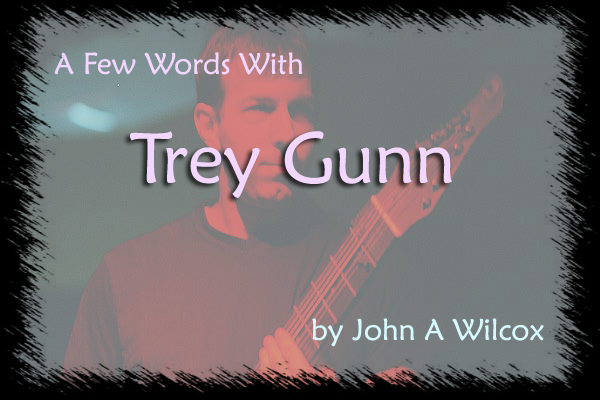
As we all know by now, Trey Gunn plays in 321 bands all featuring his distinct Warr Guitar playing. On the eve of a 2014 tour with the Security Project, I decided to focus on the band and the show. Join Progsheet for a few words with the ever-thoughtful Trey Gunn...
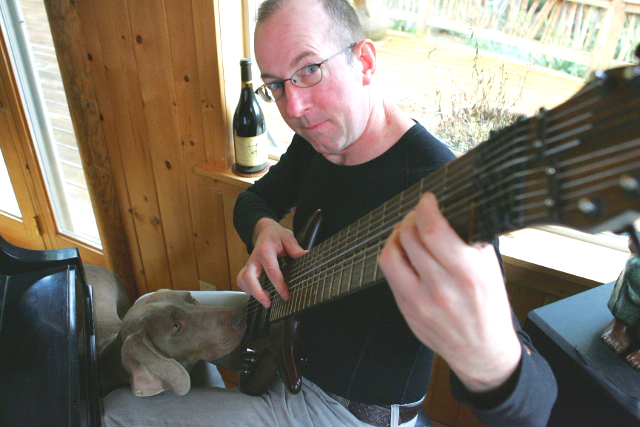
PS: What interested you in joining the Security Project?
TG: When I was approached with the idea I figured I would hear a �No� inside. But, weirdly, I didn't. I didn't hear a huge �Yes�, but it wasn't a �No.� This intrigued me, as the idea of playing a whole show of someone else's music isn't something I would think to put my energies towards. But...I love playing with Jerry so much. And I completely love Gabriel's third (Melting Face) and fourth (Security) records. They were essential to my own musical background and a witness to how a musical vision can color all the aspects of a recording. As I thought about it more and more it sounded like a great challenge � to try to honor the original, but color it in my own way and with the tools that we now have access to. So, now it is a �Yes!�
PS: You've worked with a veritable who's who of drummers and percussionists. What stands out about Jerry Marotta's playing?
TG: Jerry was one of the first, really experienced professionals who gave me a whole new level of confidence in my playing. I met him at the recording sessions for the David Sylvian/Robert Fripp project. I had already been writing and playing with Robert and David, but when we went into the studio to make the record I really felt like I was being put on the hot coals with Jerry as my rhythm partner.
His playing is so solidly in the center of the pocket that I feared any of my own quirky rhythmic aspects would stick out like misaligned clock hands. Jerry wiped that away in seconds. He told me my feel was great and we just got on with it. And, then, on top of my playing he came up with some truly astounding approaches to the drums. These pieces, mind you, were written originally for David, Robert and I as a three-piece without any percussion.
Jerry has that wonderful capacity to a take a left-field approach and, yet, still make it fall into the pocket.
PS: What other players will I see with you when the band hits Toad's Place in New Haven?
TG:
Jerry Marotta: Drums & Percussion, Backing Vocal
Trey Gunn: Warr Guitar, Backing Vocal
Brian Cummins: Lead Vocal
Fuzzbee Morse: Guitars, Flute, Backing Vocal
David Jameson: Keyboards & Eigenharp
PS: What exactly is an Eigenharp & what does it do that a keyboard cannot?
TG: http://www.eigenlabs.com/
Super expression synth controller. Looks like a bassoon from Mars.
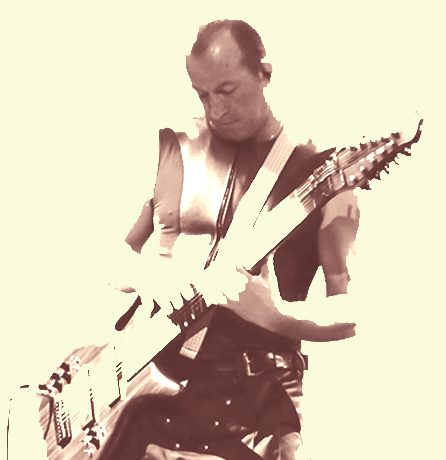
PS: I've seen you several times in the past at Toad's. What do you enjoy most about performing in that venue?
TG: Toad's Place is the perfect blend of a club and a theater vibe. It is big enough to accommodate a decent size band with room for a good sized audience. And it is also small enough to feel very intimate. Perfect for The Security Project.
PS: Last year the band did shows marking the anniversary of Peter Gabriel's So album. What is different this go around in terms of material?
TG: No, I think you might be confusing us with Peter's actual band. They did a tour for the anniversary of the So album. The Security Project only plays pre-So material in our performance. Nothing from So.
Our approach to picking material was to choose things that Peter didn't play. Why would you want to come hear us do material that Peter was out playing? It doesn't make any sense. So we have gone with the darker heavier stuff and some of the quirkier older material. More my speed.
PS: Beyond choosing songs that Gabriel doesn't play currently, are there any other criteria for the songs the band chooses for any given set?
TG: That it is something that we can sink our teeth into, basically. Pieces that sound convincing coming off our fingers. I, actually, didn't know the 2nd record that well and didn't know the first record at all. (Just like Crimson, BTW! I had heard basically nothing before 1980, beside Red and Schizoid Man when I joined the group.) Gabriel's first two recordings are some of Jerry's favorites. So he has been enlightening me to their worthiness!
PS: Are there any songs that the band tried to tackle that just didn't make it to the live set?
TG: Ha! Do you want a list of all the pieces I have tried to play in my life but sucked at? I don't think so. ;)
PS: Will the band be tackling any of Gabriel's Genesis-era material?
TG: We have more material than one show will allow. So, I can't say what will be in the setlist for Toad's. But we do have some early gems available!
PS: Will you be playing any bass for these shows, or is it strictly touch guitars?
TG: Just my 10-string Warr Guitar.
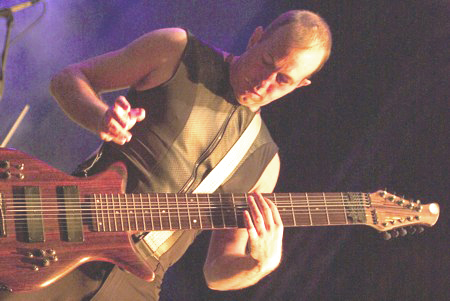
PS: When playing a bass part on the touch guitar, is any aspect of the character of the note different?
TG: Yes. Obviously, some of this material had Tony Levin playing Stick on it � which translates directly to my instrument. Other material was originally done on bass and I have to choose how to adjust. Do I adjust myself and my hands, or do I adjust the part to fit me and my instrument? I use all of the above!
But, this leads to an super cool thing about this project. There are really three approaches that we bring to this material.
For one, some of the very older pieces, like off the first two records, are relatively straightforward. And we just play them as they come. This works best without trying to tinker with what is there. Just shut-up and play the tune.
For the second approach, some of the sounds on the records are so incredibly strange and not easy to duplicate. Even for Peter they had to make choices and adjustments to what could actually be done live. So either we figure out ways to get these sounds using technology that wasn't available at the time, or we have gone ahead and altered the music to suit what sounds we can make. Two examples come to mind. Since my instrument is two instruments in one, I can bring in extra (and strange) rhythm guitar parts that interlock with Fuzzbee while still holding the bass part. Another is David, our keyboard, uses the Eigenharp to play things that just aren't possible with the keyboards. And those are just two small examples. We have diddled around with the orchestrations of this material to make it really sing. A lot.
With the third approach, we have thrown out the original version right from the beginning and made our own creation. This is the most challenging, but has the ultimate reward. I look at it like this: Peter's recordings are a kind of score of an original impulse. Or I suppose they are really the band, at the time, doing their reading of the score. If we, as The Security Project, can tear apart the recording and find what feels like the �original score� underneath the piece, then we can put it back together in a whole new way. A way that suits the current time and the present players.
So, between all of these we have an awesome �reading� of Peter's first four albums. In a unique way that even Peter wouldn't do. Obviously we aren't trying to be Peter and Peter's band. We are aiming to take this brilliant material and turn it into something of our own.
And I will say, that it is DAMN HARD. You can play all the notes right and it still can sound like crap. This material is much more elusive that you would think. Even more elusive that I thought. And I have been listening to it since it first came out.
PS: The last time I saw you at Toad's Place was one of your last gigs with King Crimson in late 2003. In the intervening decade-plus, what has been your biggest insight into the potential of the touch guitar?
TG: The touch guitar, and the tapping approach, is still quite young. But a lot of things have changed and been developed over the last decade. One big one is Markus Reuter's breakdown of the mechanics of the technique. No one's approach comes remotely close to what Markus has figured out, and articulated, in how the body produces a sound on a string by tapping.
A second is that, for me, the next evolution of the instrument is to turn it horizontally and play it either on the lap or on a stand. This, I have no doubt, opens up the instrument to a level of playing that isn't possible when being held as a guitar. You won't see that in these Security Project shows, but I have been diligently working on this for the last five years.
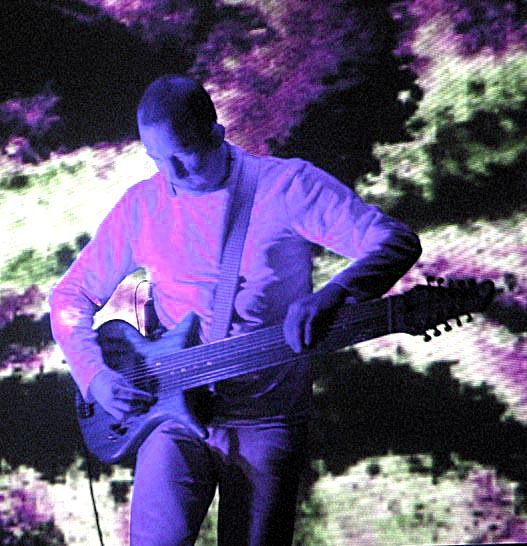
PS: Did your years playing beside Tony Levin give you any insight into the psychology behind his parts on this Gabriel material?
TG: Nope, not really. !!!! Though I would say that Tony has magic in his hands and standing next to those hands at work certainly has helped my own playing over the years.
PS: When you finish these dates, what projects are on your schedule for 2014/15?
TG: I have shows with TU (Pat Mastelotto), and shows with my bass trio (Michael Manring and Alonso Arreola) lined up for this year. Plus, more Security Project in the fall. My label is releasing a fair amount of materiel this year and I have two recordings in the works for myself.
PS: Please tell me 6 albums you never get tired of listening to.
TG: No album fills that criteria. I go through phases where I deeply listen to something and then I have to abandon it for, generally, many years before I want to hear it again. Lately, I have resurrected Elliot Smith and Steve Reich recordings. In the middle of last year I was in a Buke and Gase phase.
###
Table Of Contents
Contact





